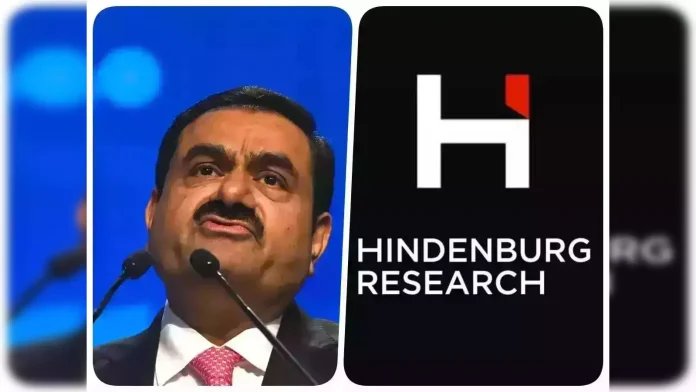In a major development in the world of finance and short-selling, Hindenburg Research, the US-based firm known for its controversial reports targeting major companies, is set to disband. The decision to shut down the firm comes after a series of high-profile actions, most notably its report in January 2022 that accused the Adani Group of stock manipulation and accounting fraud. This report led to a massive shake-up in the financial markets, not just in India, but globally. The firm’s decision to disband has sent shockwaves across the investment community, raising questions about the future of short-selling and the ethics surrounding such practices.
A Controversial Legacy
Hindenburg Research, led by its founder Nathan Anderson, gained notoriety for its aggressive short-selling tactics, where it took positions against companies and published research alleging fraudulent practices, market manipulation, or accounting irregularities. The firm’s most famous and arguably most controversial report targeted the Adani Group, one of India’s largest conglomerates, in early 2022. Hindenburg accused the Adani Group of inflating stock prices and misrepresenting financial data.
The report led to an immediate and dramatic fall in the stock prices of Adani Group companies, wiping out billions of dollars in market value. It also triggered an intense legal and regulatory battle, with the Adani Group strongly denying the accusations and filing lawsuits against Hindenburg for defamation and market manipulation. Despite the group’s rebuttals, the report garnered widespread media attention and cast a shadow over the Adani empire’s business dealings.
In addition to the Adani report, Hindenburg Research had previously targeted several other companies, including electric vehicle maker Nikola and insurance company Clover Health. These reports often led to significant drops in the targeted companies’ stock prices, further cementing the firm’s reputation for its high-impact, and at times controversial, research.
The End of an Era
The announcement of Hindenburg Research’s disbandment has raised eyebrows, given the firm’s significant role in high-stakes short-selling. Sources close to the firm have cited “internal challenges” and “market changes” as the main reasons behind the decision. One factor might be increasing regulatory scrutiny on short-selling firms and the ethics surrounding their operations, especially after Hindenburg’s actions against Adani drew widespread debate over the role of short-sellers in market dynamics.
Regulatory authorities in both India and the United States have been examining the broader implications of such short-selling activities, especially after high-profile cases like Hindenburg’s. The firm’s tactics of publishing explosive reports, often followed by a sharp market reaction, have led to concerns about the potential for market manipulation and the ethics of profiting from the downfall of companies.
Despite its aggressive strategies, Hindenburg’s ability to influence stock prices through its reports has sparked conversations about the need for greater transparency and accountability in the financial markets. As the firm disbands, there is speculation about how the short-selling industry will evolve, particularly with the increasing focus on corporate governance and regulatory oversight.
The Future of Short-Selling
Hindenburg Research’s closure may signify the beginning of a new chapter in the short-selling landscape. As short-sellers face more scrutiny, many are calling for greater regulation of their practices to prevent market manipulation. While short-selling itself is legal and often viewed as an important tool for ensuring market efficiency, the use of research reports to influence stock prices raises questions about fairness and transparency.
Financial experts have also pointed out that the closure of such a high-profile firm could lead to a decline in the number of short-sellers focusing on controversial reports. This could impact market dynamics and the balance between risk and reward for investors. Furthermore, institutional investors and regulatory bodies may take a closer look at the way such firms operate and how they use their platforms to influence stock prices.
Adani Group’s Response and Market Reactions
The Adani Group, which was at the center of the storm created by Hindenburg Research’s report, has welcomed the news of the firm’s disbandment. In a statement, the group reiterated its stance that the allegations made by Hindenburg were baseless and part of a coordinated attack on its business. The group has also stated that it intends to continue its efforts to safeguard its reputation and business interests in the face of any future challenges.
Markets reacted cautiously to the news of Hindenburg’s disbandment. While the firm’s shutdown removes a significant force from the short-selling landscape, investors remain wary of the broader implications for market behavior. The Adani Group’s stock prices, which had experienced significant volatility after Hindenburg’s report, showed signs of stabilizing in the days following the announcement.
Conclusion
The disbandment of Hindenburg Research marks the end of a controversial chapter in the world of short-selling. While the firm’s influence on the financial markets and its role in targeting companies like Adani Group will remain a topic of debate, its closure raises important questions about the ethics and regulation of short-selling practices. As the financial landscape evolves, both investors and regulatory bodies will need to adapt to ensure fairness and transparency in the markets. For now, the future of short-selling remains uncertain, but the impact of Hindenburg Research’s exit will undoubtedly be felt in the years to come.
BY- NIKITA




